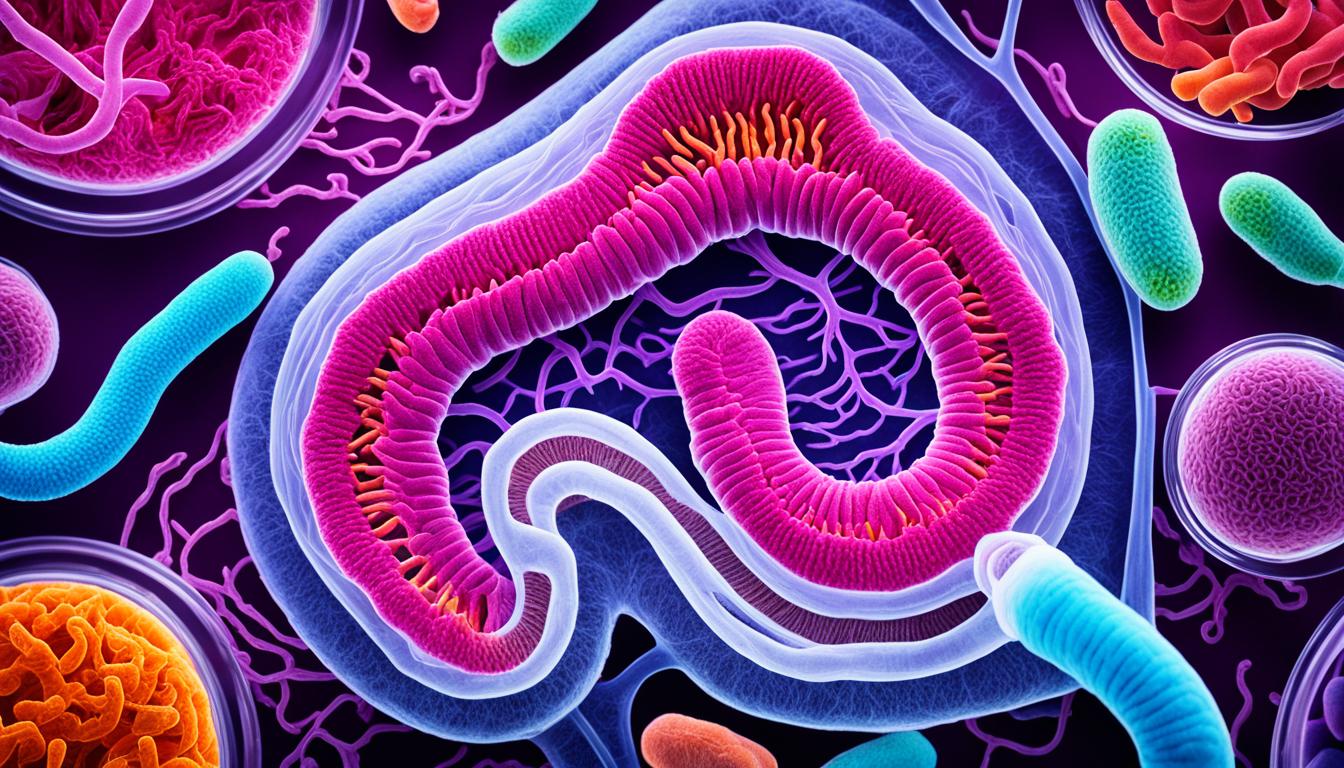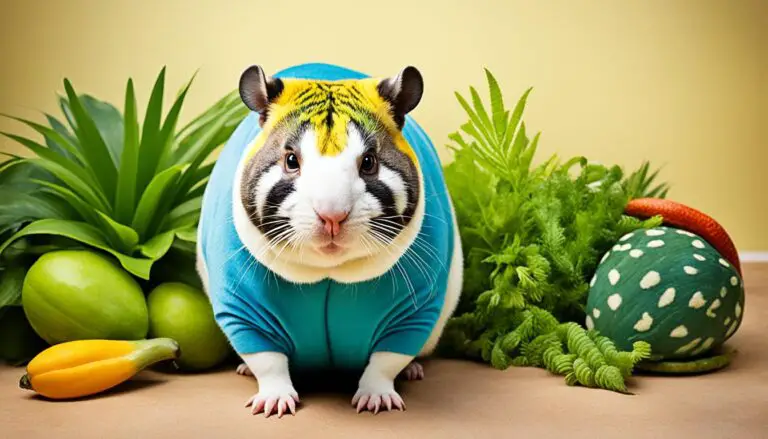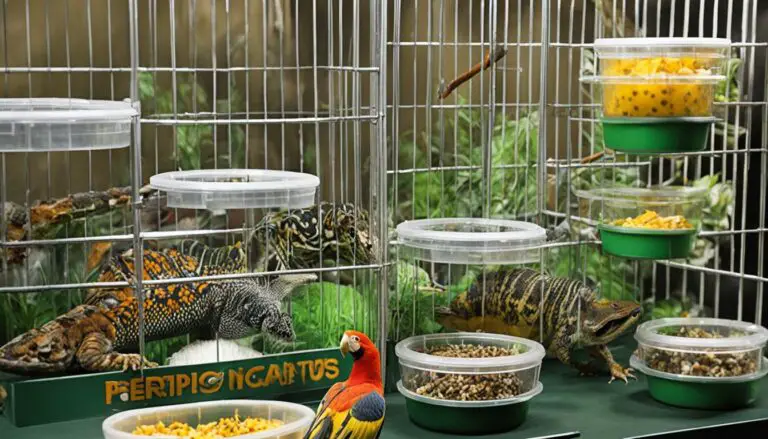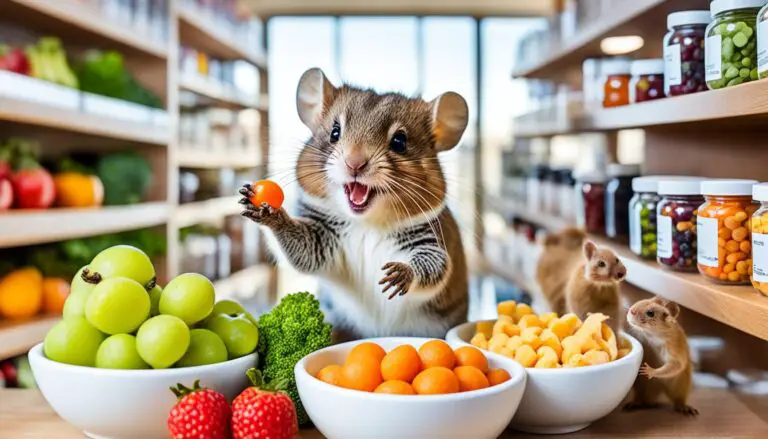Prebiotics & Probiotics for Exotic Pet Gut Health
Maintaining gut health is key for exotic pets. This includes reptiles, birds, and small mammals. A healthy gut is vital for their well-being.
Understanding Prebiotics and Probiotics
Exotic pets’ digestive health greatly benefits from prebiotics and probiotics. They help keep the gut’s bacteria balanced. This supports good digestion and the pet’s general health. Below, we’ll explore how prebiotics and probiotics help exotic pets.
The Power of Prebiotics
Prebiotics are food parts that our bodies can’t digest. They feed the good bacteria in the gut. This boosts the number and activity of these bacteria, improving gut health. A healthy digestive system is crucial for exotic pets’ well-being, and prebiotics help in this area.
“Prebiotics act as a food source for beneficial bacteria in the gut, supporting their growth and enhancing gut health in exotic pets.” – Dr. Jessica Reynolds, Veterinarian
The Magic of Probiotics
Probiotics are live microorganisms that bring big health benefits. They add more good bacteria to the gut. This helps balance the gut’s microorganisms, which supports healthy digestion. Thus, probiotics are key for maintaining overall wellness in exotic pets.
“Probiotics are live microorganisms that, when consumed in adequate amounts, provide numerous health benefits, including improved digestion and a strengthened immune system.” – Dr. Emily Carter, Veterinary Specialist
Using prebiotics and probiotics means better care for your exotic pets. Adding these to their diet improves their gut health. And, a happy gut leads to pets that are both healthy and joyful.

The Importance of Gut Health for Exotic Pets
Gut health is very important for exotic pets. It affects their overall health and happiness. A good gut helps digest and absorb food, supports immunity, and stops sickness.
All animals, including exotic pets, can use prebiotics and probiotics. These help keep their gut healthy.
The Role of Gut Health in Exotic Pets
“A healthy gut microbiota is key for exotic pets. It’s important for digesting, absorbing nutrients, and staying healthy,” says Dr. Emily Hernandez. She’s an exotic animal vet. “The gut’s bacteria play a big part. If their balance is off, pets might get sick more.”
Exotic pets, with their unique diets, can have tummy troubles. They need extra care to keep their gut healthy.
Both prebiotics and probiotics are good for exotic pets. Prebiotics are fibers that feed good gut bacteria. They help with digestion and nutrient use.
Probiotics are live bacteria or yeast. They add more good bacteria to the gut. This helps with digestion and keeps the gut healthy.
Benefits of Prebiotics and Probiotics for Exotic Pets
- Promote better digestion
- Enhance nutrient absorption
- Support a strong immune system
- Reduce the risk of gastrointestinal disorders
- Improve overall gut health
These benefits are great for pets with tummy problems. Prebiotics and probiotics can help their gut stay balanced. This keeps the pets healthy.
| Benefits of Prebiotics and Probiotics for Exotic Pets | Exotic Pets | Gastrointestinal Health | Prebiotics and Probiotics |
|---|---|---|---|
| Promote better digestion | Support nutrient absorption | Boost immune system | Reduce risk of GI disorders |
| Gut health | Optimize overall well-being | Enhance the balance of gut microbiota | Improve overall gut health |

Always get advice from a vet used to exotic pets before using prebiotics and probiotics. Each pet is different. Their special needs should be considered with these supplements.
By caring for their gut, and using prebiotics and probiotics, owners help their pets live better. They ensure their pets are happy and healthy.
Benefits of Prebiotics and Probiotics for Exotic Pets
Prebiotics and probiotics are great for exotic pets. They help with digestion and keep them healthy. These are especially important for animals like reptiles, birds, and small mammals.
Promoting Digestive Function
Exotic pets often have sensitive stomachs. Good digestion is key to keeping them well. Prebiotics and probiotics balance the good bacteria in your pet’s gut. This makes it easy for them to digest food and absorb nutrients.
Reducing Gastrointestinal Disorders
Many exotic pets face stomach issues because of their special diets and homes. Prebiotics and probiotics lower the risk of these problems. They create a gut environment that’s bad for harmful bacteria. This means fewer tummy troubles for your pet.
Enhancing Nutrient Absorption
Exotic pets need nutrients to be healthy. Prebiotics and probiotics help the body get these nutrients from food. By improving digestion, these supplements ensure that your pet processes food well.
Boosting the Immune System
Strong immunity is vital for exotic pets. Prebiotics and probiotics make the immune system healthier. They support an important immune tissue in the gut. This boosts the body’s disease-fighting abilities.
Supporting Overall Gut Health
Gut health directly affects an exotic pet’s well-being. The right balance in the digestive system is crucial. Prebiotics and probiotics keep the gut happy, which helps with digestion, nutrient use, and a strong immune system.
“Prebiotics and probiotics offer a natural and effective way to support the digestive health of exotic pets.”
Adding prebiotics and probiotics to an exotic pet’s daily care is smart. You can find them in powders, capsules, or treats. Always talk to your vet to pick the best type and amount for your pet.

Choosing the Right Prebiotics and Probiotics for Exotic Pets
Exotic pets need special care for their stomachs. Prebiotics and probiotics help keep their guts healthy. It’s key to pick the best ones for safety and effect.
Choose supplements made just for exotic pets. They should have many good bacteria types. Bacillus coagulans is a top pick. It can live through the stomach’s acid.
Think about your pet’s type and age, and any stomach issues they have. Every animal might need different nutrition. So, pick prebiotics and probiotics that fit your pet’s needs.
Getting advice from an exotic pet vet is wise. They know what’s best for your pet’s diet. Their tips can help a lot.
For exotic pets, a personal gut care plan is crucial. With the right prebiotics and probiotics, you can boost your pet’s health and happiness.
Choosing Prebiotics and Probiotics for Exotic Pets: Key Considerations
- Look for products formulated specifically for exotic pets.
- Opt for supplements with a variety of beneficial bacterial strains.
- Incorporate Bacillus coagulans for its ability to survive the acidic environment of the gastrointestinal tract.
- Consider your pet’s species, age, and specific digestive concerns.
- Consult with a veterinarian experienced in exotic pet care for personalized recommendations.

| Product | Beneficial Bacterial Strains | Species-Specific Formulation |
|---|---|---|
| ProBioPet | Lactobacillus acidophilus, Bifidobacterium animalis, Bacillus coagulans | Yes |
| GutGuard Plus | Bacillus licheniformis, Enterococcus faecium, Saccharomyces cerevisiae | No |
| ExoDigest | Bacillus subtilis, Lactobacillus plantarum, Streptococcus thermophilus | Yes |
Implementing Prebiotics and Probiotics in Exotic Pet Care
Add prebiotics and probiotics into your unique pet’s diet to keep their gut healthy. Use these as part of their meals or as extra. They are key for your pet’s stomach health and feeling good. Always check with a vet and the product’s doses to use them right for your pet.
Keep an eye on how your pet’s stomach is doing when they start this diet. If you see good changes, that’s a sign they’re working. Adjust as needed to keep your pet’s gut happy.
Benefits of Implementing Prebiotics and Probiotics in Exotic Pet Care
These help keep a good mix of helpful germs in your pet’s stomach. This supports how their body breaks down food and absorbs nutrients. It also makes their immune system stronger and keeps their stomach from getting sick.
“Incorporating prebiotics and probiotics into an exotic pet’s care routine can significantly contribute to their well-being and longevity. These nutritional interventions have been shown to improve digestion, nutrient absorption, and support a healthy immune system, all essential for promoting gut health in unique pets.”
For your non-traditional pet, pick prebiotic and probiotic supplements that meet their nutritional needs. Choose ones packed with good types of bacteria to make sure your pet’s stomach has a lot of different useful germs. A bacteria known as Bacillus coagulans is good because it can survive the stomach’s acid.
Implementing Prebiotics and Probiotics: Dosage Guidelines
Use the product’s directions when adding prebiotics and probiotics to your pet’s diet. This helps things work well in their stomach. Talk to your vet to get the best advice on what your pet needs and any risks.
Monitoring Exotic Pets’ Gut Health
Make checking your pet’s stomach health a routine. Watch for better eating and fewer stomach problems. This can show that what they’re eating is making their stomach better.
| Benefits of Implementing Prebiotics and Probiotics in Exotic Pet Care | Dosage Guidelines | Monitoring Gut Health |
|---|---|---|
| Improved digestion and nutrient absorption | Follow recommended dosage guidelines provided by the manufacturer | Regular assessment to evaluate effectiveness: reduced gastrointestinal issues and enhanced nutrient absorption |
| Enhanced immune system function | Consult with a veterinarian to ensure appropriate use based on pet’s specific needs | Observation of gradual improvements in digestion and overall well-being |
| Prevention of gastrointestinal disorders |
Using prebiotics and probiotics can greatly help your exotic pet’s stomach and well-being. By following the right doses, checking your pet’s stomach health often, and picking good supplements, you help them have a healthy digestive system.
Tips for Maintaining Exotic Pet Gut Health
There are more ways to help your exotic pet’s gut besides prebiotics and probiotics. These practices are key in making sure your pet’s digestion is top-notch. By following these steps, exotic pet owners can keep their friends happy and healthy.
Provide a Balanced and Species-Appropriate Diet
Feeding your exotic pet the right diet is vital for their gut health. Each type of pet needs a diet that meets its specific needs. It’s crucial to get advice from a vet or nutritionist who understands exotic animals.
Ensure Access to Clean and Fresh Water
For exotic pets, staying hydrated is critical for a healthy gut. Always keep their water supply fresh and clean. Also, clean their drinking containers often to avoid bacteria build-up.
Encourage Regular Exercise
Exercise is good for keeping exotic pets and their digestive system healthy. It helps move things along in their stomachs and keeps their gut in good shape. Provide activities that match your pet’s natural behaviors.
Practice Stress Management
Exotic pets’ digestive health can suffer from stress. It’s important to keep their environment quiet and stable. Enrichment and activities can also lower your pet’s stress and support their gut.
“A balanced and species-appropriate diet, access to clean water, regular exercise, and stress management are vital for maintaining a healthy gut in exotic pets.”
Avoid Unnecessary Administration of Antibiotics
Antibiotics can upset your exotic pet’s stomach by changing their gut bacteria. Give antibiotics only as your vet orders and follow their advice closely. This prevents issues with your pet’s gut health.
Using these tips alongside prebiotics and probiotics helps keep your exotic pet’s gut healthy. Focus on a holistic approach to care to ensure your pet’s well-being.
| Practices for Maintaining Exotic Pet Gut Health | Benefits |
|---|---|
| Provide a balanced and species-appropriate diet | Supports proper digestion and nutrient absorption |
| Ensure access to clean and fresh water | Promotes hydration and healthy bowel movements |
| Encourage regular exercise | Aids in bowel movement and overall gut health |
| Practice stress management | Reduces digestive system-related stress and promotes a healthy gut |
| Avoid unnecessary administration of antibiotics | Prevents disruption of the natural gut microbiota |
Potential Risks and Precautions
Prebiotics and probiotics are safe for many exotic pets, but be careful. Always check with a vet before adding them to your pet’s diet. Wrong use could upset their stomachs. Remember, each exotic pet is different. A vet will recommend the best products for your pet.
Potential Risks
Keeping unique pets’ gut health in check is key. Some pets might not react well to certain prebiotics or probiotics. They could get stomach aches, have diarrhea, or other issues. Make sure to not give too much and watch how your pet reacts.
Consulting with a Veterinarian
Talking to a vet is the top way to keep your exotic pet healthy. They’ll offer advice tailored to your pet’s health, species, and needs. Vets will suggest the right prebiotics and probiotics and how to give them. Their advice reduces the chance of any problems and helps your pet’s gut stay healthy.
Exotic pets need more than just prebiotics and probiotics. They also need a good diet, water, exercise, and ways to deal with stress. With a vet’s help, you can make sure everything works well together.
Quality and Selection
When picking prebiotics and probiotics, quality is key. Find supplements that are right for your pet’s species and are from trusted brands. This ensures they are safe and work well.
Choose products with many good bacteria types. This mix helps your pet’s gut in lots of ways.
Pet-Specific Considerations
Every exotic pet has special digestive needs. Some animals, like those who eat plants, may need different supplements. A vet who knows about exotic pets can help you pick the best options.
| Potential Risks and Precautions: Summary |
|---|
| 1. Consult with a veterinarian before introducing prebiotics and probiotics into your exotic pet’s diet. |
| 2. Be cautious of excessive use or improper administration of supplements. |
| 3. Watch for any signs of digestive upset or imbalances in the gut microbiota. |
| 4. Choose prebiotic and probiotic products tested and approved for specific exotic pet species. |
| 5. Consider the unique needs of each exotic pet species when selecting supplements. |
With these steps and a vet’s advice, prebiotics and probiotics will safely help your pet’s gut health.
Conclusion
Prebiotics and probiotics are vital for exotic pets’ gut health. They help balance good bacteria in the stomach. This, in turn, aids digestion and boosts an exotic pet’s health. By adding these to your exotic pet’s food, you can help them digest food better, absorb nutrients, and have a stronger defense system.
Choosing the right products is key. Always talk to a vet first. They can recommend the perfect prebiotic and probiotic for your pet. They’ll base this on your pet’s type, how old they are, and any digestive issues they face.
With the right care and these supplements, exotic pets can have great gut health. Plus, they’re likely to have a happier, healthier life. Remember, stick to the dosage from the manufacturer. Also, keep an eye on your pet’s stomach health and adjust as necessary. Keeping their gut healthy ensures your pet stays happy and lives well.
FAQ
What role do prebiotics and probiotics play in maintaining gut health in exotic pets?
What are prebiotics and probiotics?
Why is gut health important for exotic pets?
What are the benefits of prebiotics and probiotics for exotic pets?
How do I choose the right prebiotics and probiotics for my exotic pet?
How can I incorporate prebiotics and probiotics into my exotic pet’s diet?
What other practices can help maintain gut health in exotic pets?
Are there any potential risks or precautions when using prebiotics and probiotics in exotic pets?
What role do prebiotics and probiotics play in maintaining gut health in exotic pets?
Source Links
- https://exoticpetsnj.com/products/nulo-digestion-gut-health-functional-granola-bars-for-dogs
- https://todaysveterinarynurse.com/nutrition/prebiotics-and-probiotics-for-dogs-and-cats/
- https://www.drharveys.com/products/dogs/466-digestive-probiotics-soft-chews
Peter Stones is the founder of Exotic Pets Place, the leading online resource for exotic pet care information.
With over 10 years of hands-on exotic pet ownership experience, he is deeply passionate about sharing his expertise to help others properly care for their unusual pets.
When he's not writing extensively researched articles or connecting with fellow exotic pet enthusiasts worldwide, you can find Peter at home tending to his own beloved menagerie of exotic animals.







